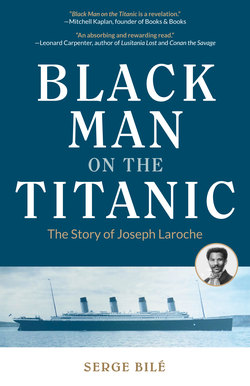Читать книгу Black Man on the Titanic - Serge Bile - Страница 40
На сайте Литреса книга снята с продажи.
ОглавлениеA few months later, again in history class, Joseph heard about other sinking ships. He learned that, during the slave trade, at least ten ships disappeared off the shores of Le Cap or in Haitian waters, causing the death of hundreds of slaves chained at the bottom of the hold. The last known sinking had happened on August 27, 1775, when the Saint-Guillaume54 was coming back from Guinea with 660 slaves on board. Following a navigational error, the ship hit a reef. It was submerged by raging waters, Joseph was told, and the young man began to feel dread about his upcoming trip. These historic facts horrified him. How could he get peacefully onto a boat, knowing that it might go underwater? Land offered safety. Was it really reasonable to go to sea and put oneself in danger? Shaking off the fear, Joseph reassured himself with the thought that, after all, with the great advancements of technology, sailing was now safer. Even God could not sink today’s liners. Anyway, why would He do such a thing? The Laroches were good Christians, from grandfather to grandson.
▪ ▪ ▪
Five months after the sinking of the Ville de Saint-Nazaire, Euzélie Laroche was smiling again: Joseph’s doubts had subsided. He told himself that there was no point in being scared so soon of a trip that would not happen for years. He was only eleven years old; college was not around the corner. He might as well have fun. “What must happen will happen,” he thought. “It’s up to fate.”
But often, it is during those times of boyish insouciance, when life quietly goes on, that the unexpected suddenly happens. The bad news comes: Tragedy has struck. And what tragedy in this case! On August 4, 1897, a little after eleven thirty in the morning, the news spread like wildfire. It traveled from house to house, from neighborhood to neighborhood, across the city: Bertrand Laroche55 was dead. He’d just ended his own life. When she learned of her brother’s suicide, Euzélie was crushed. She had not seen it coming. Pain and consternation gripped her heart. She didn’t understand.
How can one die at thirty-two years old? Of course, her brother’s business as a speculator came with some difficulties—the falling price of the coffee was affecting everyone, including Euzélie—but… suicide? She wondered what had really driven him to such an irreparable act. Maybe a woman had broken his heart? “That’s still no reason to kill oneself,” Joseph’s mother said with sadness, recalling another suicide that had shaken the family seven years earlier. Her nephew, poet Arnold Laroche,56 had killed himself in Paris. When Euzélie had learned about Arnold, he’d already been buried in the family vault at the Père-Lachaise cemetery for several months, which had added to her distress.
During those years, mail services were by ship and as slow as one can imagine. There were no telephones in Le Cap. The telephone company only became operational in 1893, shortly after the installation of the first street lights.
Joseph was shocked by the sudden death of Uncle Bertrand, who had taught him how to swim and spoiled him every time he visited. He was stunned and saddened. He couldn’t believe it. “Why?” he wondered. “Why would he do that?” No one knew. Not even his grandmother, who often told him about colonial times, when the enslaved Africans sometimes chose to hang themselves rather than continue serving a master. Suicide was a way for those men to free themselves, a passage back to Africa: they believed that death would take them back to the motherland, where they would be reunited with the parents from whom they had been torn. Because of the feverish desperation in which they lived, it made sense for enslaved men to contemplate suicide, Joseph thought, although at his age these concepts were still a little over his head. In the case of Uncle Bertrand, though, he couldn’t understand the willful, self-inflicted death of a man who’d been deeply loved, and whose family lived right here, in this country, in Haiti.
The wake for Bertrand Laroche became the occasion for a big family reunion, as such circumstances usually warranted. The entire family gathered in the house where he’d lived, at the corner of Rue Royale and Rue du Hasard. The women, assembled around the body, prayed the rosary and sang hymns.
